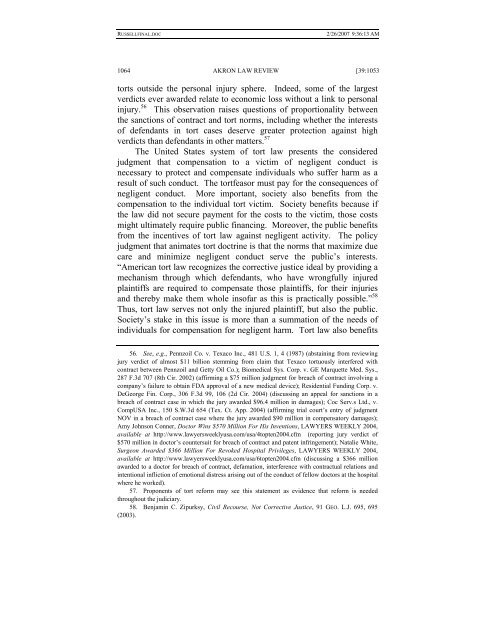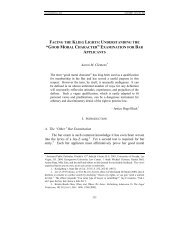THE LOGIC OF LEGAL REMEDIES AND THE RELATIVE WEIGHT ...
THE LOGIC OF LEGAL REMEDIES AND THE RELATIVE WEIGHT ...
THE LOGIC OF LEGAL REMEDIES AND THE RELATIVE WEIGHT ...
You also want an ePaper? Increase the reach of your titles
YUMPU automatically turns print PDFs into web optimized ePapers that Google loves.
RUSSELLFINAL.DOC<br />
2/26/2007 9:36:13 AM<br />
1064 AKRON LAW REVIEW [39:1053<br />
torts outside the personal injury sphere. Indeed, some of the largest<br />
verdicts ever awarded relate to economic loss without a link to personal<br />
injury. 56 This observation raises questions of proportionality between<br />
the sanctions of contract and tort norms, including whether the interests<br />
of defendants in tort cases deserve greater protection against high<br />
verdicts than defendants in other matters. 57<br />
The United States system of tort law presents the considered<br />
judgment that compensation to a victim of negligent conduct is<br />
necessary to protect and compensate individuals who suffer harm as a<br />
result of such conduct. The tortfeasor must pay for the consequences of<br />
negligent conduct. More important, society also benefits from the<br />
compensation to the individual tort victim. Society benefits because if<br />
the law did not secure payment for the costs to the victim, those costs<br />
might ultimately require public financing. Moreover, the public benefits<br />
from the incentives of tort law against negligent activity. The policy<br />
judgment that animates tort doctrine is that the norms that maximize due<br />
care and minimize negligent conduct serve the public’s interests.<br />
“American tort law recognizes the corrective justice ideal by providing a<br />
mechanism through which defendants, who have wrongfully injured<br />
plaintiffs are required to compensate those plaintiffs, for their injuries<br />
and thereby make them whole insofar as this is practically possible.” 58<br />
Thus, tort law serves not only the injured plaintiff, but also the public.<br />
Society’s stake in this issue is more than a summation of the needs of<br />
individuals for compensation for negligent harm. Tort law also benefits<br />
56. See, e.g., Pennzoil Co. v. Texaco Inc., 481 U.S. 1, 4 (1987) (abstaining from reviewing<br />
jury verdict of almost $11 billion stemming from claim that Texaco tortuously interfered with<br />
contract between Pennzoil and Getty Oil Co.); Biomedical Sys. Corp. v. GE Marquette Med. Sys.,<br />
287 F.3d 707 (8th Cir. 2002) (affirming a $75 million judgment for breach of contract involving a<br />
company’s failure to obtain FDA approval of a new medical device); Residential Funding Corp. v.<br />
DeGeorge Fin. Corp., 306 F.3d 99, 106 (2d Cir. 2004) (discussing an appeal for sanctions in a<br />
breach of contract case in which the jury awarded $96.4 million in damages); Coc Serv.s Ltd., v.<br />
CompUSA Inc., 150 S.W.3d 654 (Tex. Ct. App. 2004) (affirming trial court’s entry of judgment<br />
NOV in a breach of contract case where the jury awarded $90 million in compensatory damages);<br />
Amy Johnson Conner, Doctor Wins $570 Million For His Inventions, LAWYERS WEEKLY 2004,<br />
available at http://www.lawyersweeklyusa.com/usa/4topten2004.cfm (reporting jury verdict of<br />
$570 million in doctor’s countersuit for breach of contract and patent infringement); Natalie White,<br />
Surgeon Awarded $366 Million For Revoked Hospital Privileges, LAWYERS WEEKLY 2004,<br />
available at http://www.lawyersweeklyusa.com/usa/6topten2004.cfm (discussing a $366 million<br />
awarded to a doctor for breach of contract, defamation, interference with contractual relations and<br />
intentional infliction of emotional distress arising out of the conduct of fellow doctors at the hospital<br />
where he worked).<br />
57. Proponents of tort reform may see this statement as evidence that reform is needed<br />
throughout the judiciary.<br />
58. Benjamin C. Zipurksy, Civil Recourse, Not Corrective Justice, 91 GEO. L.J. 695, 695<br />
(2003).
















